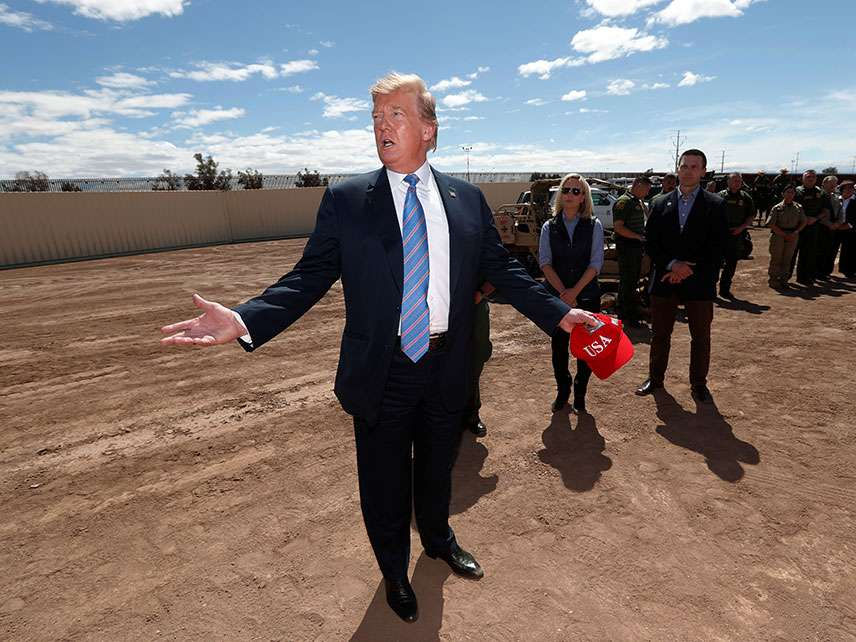Of Course the Country Isn't Full — and Trump Knows It
- OurStudio

- Apr 9, 2019
- 4 min read

KEVIN LAMARQUE/REUTERS/Newscom
In remarks over the weekend, President Trump expressed his opposition to immigration as a matter of practical impossibility. "What can we do?" he said. We can't handle any more. Our country's full. You can't come in, I'm sorry." Later, seeming a touch less apologetic, he followed up on the sentiment with yet another of his oddly capitalized tweets. "Our Country is FULL!"
Of course it isn't. There are at least 145 countries more physically dense than the U.S. There is no sense in which America has reached its capacity to hold, support, or employ people. If anything, the opposite is true—and Trump, of all people, surely knows it.
Consider Maine. In March, the state's senators, Susan Collins and Angus King, led a bipartisan group of lawmakers in writing to then-Secretary of Homeland Security Kirstjen Nielsen, requesting an increase in the number of visas for foreign workers, because of the "continued tightening of the labor market" and the "growing need for seasonal workers."
The letter warned that many parts of the country "simply lack the working-age population to meet the demand for seasonal jobs. In some industries, particularly tourism, the demand for workers so far outstrips the available supply that businesses could be forced to curtail operations," risking the jobs of American workers. The state of Maine, the letter noted, serves some 20 million overnight tourists every year, and another 16 million people who visit during the day, mostly during the summer season. Without foreign labor, serving these people would be impossible, and many of the state's hotels and restaurants "simply could not survive."
Roughly the same thing is true in states like Alabama, Delaware, Alaska, and West Virginia, the letter said, all of which rely on the thousands of foreign workers that come to the United States each year on H-2B visas.
The point is this: Foreign workers aren't a threat to the American economy, or to American jobs. On the contrary, they are necessary to support a thriving economy, and to keep American businesses, and American jobs, in place.
That's especially true in some of the smaller, more rural, less populated states where opposition to immigration tends to be the highest. Iowa alone relies on nearly 100,000 immigrant workers. As The New York Times notes, the nation's fertility rate is at its lowest point since 1937. In the vast majority of American counties—around 80 percent—the number of prime-age workers declined between 2007 and 2017, according to the Economic Innovation Group. The relatively slow expected growth of the U.S. labor force over the next decade is a major factor in projections of slower overall economic growth.
Our president is not exactly known for his command of economic policy detail. But he knows this. He must. Not only is his administration contemplating increasing the number of H-2B visas allowed this year, yet again, but Trump's own private club, Mar-a-Lago, has employed hundreds of foreign workers over the years. When Trump was asked several years ago why he employs so many foreign workers, he said, "getting help in Palm Beach during the season is almost impossible."
For a business like Mar-a-Lago to exist and function well, foreign workers are simply necessary. That's true all over the country. What the letter from Sens. Collins and King makes clear is that places like Maine and Alabama and Alaska need more of them, not fewer. America isn't full. It hasn't reached some sort of population cap, some sort of natural or economic limitation. On the contrary, it's in desperate need of more people.
But maybe that's overthinking things. When Trump says the country is full, he's not really making a statement of fact, a coherent case to be analyzed. He's just offering another expression of the same hostility and animosity to foreigners, especially those who come through the southern border, that has long driven his political ambitions, going back to his presidential campaign announcement, in which he warned—despite plenty of evidence that immigrants are less criminal than the native born—that Mexico was sending rapists and drug dealers across the border. It's a pose meant to create the impression of toughness and resolve.
Which means it's of a piece with Trump's decision this week to oust Nielsen from her job running DHS for not being tough enough, despite having overseen some of the harshest border enforcement policies in memory, reportedly because she refused to take actions that would break the law. (Trump apparently told border agents to do the same.)
It's the same underlying instinct that led to Trump floating the possibility of ending birthright citizenship through executive order last year, the same that resulted in last year's zero-tolerance policy at the border, which led to thousands of children being forcibly separated from their parents, and the same tendency that apparently has Trump considering reinstating the separations policy despite little evidence that it worked.
"Our country is full" is not an argument. It's an excuse for draconian political symbolism that will have real and lasting consequences for both immigrants and native-born Americans.




Comments